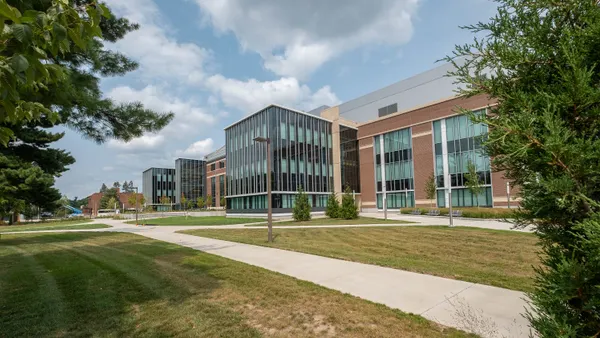Dive Brief:
-
Developers of the Treasure Island Community Development in the San Francisco Bay announced Tuesday that the project, which is in the early phases of construction, has earned LEED for Neighborhood Development Platinum certification.
-
The community, a partnership between Lennar Corp. and Stockbridge/Wilson Meany, also includes the adjacent Yerba Buena Island. It has the most acres and building area of any LEED v4–certified development, and it is one of only 17 LEED-ND Platinum properties in the world.
- LEED's ND designation is used to identify and recognize sustainable communities that are designed, built and maintained with the environment and overall resident health in mind.
Dive Insight:
The high-density development earned Platinum certification for its walk-able, compact design, various tiers of housing — up to 8,000 units with 25% of them affordable — and a reduced need for automobiles, according to Lennar. Treasure Island's redevelopment plan also includes 200,000 square feet of retail and 300,000 square feet of commercial space in addition to 500 hotel rooms, an intermodal transit hub with ferry service to San Francisco and hundreds of acres of park and open space. Infrastructure work on the Yerba Buena Island portion of the project has already begun, with construction on Treasure Island scheduled to start in 2017.
This is the latest in a string of high-density "mega developments" attempting to create almost entirely self-sustained communities within their surrounding larger cities. In Los Angeles, for example, developers are trying to beat voters to the punch by attempting to push through plans for a 14-acre, mixed-use project in the city's Arts District. SunCal wants to build 1,700 residential units, retail, office space, two hotels, a school and 23,000 square feet of community space on the current site of two warehouses.
Critics of the Los Angeles development, which in this case is wedged into just a few city blocks, have managed to secure a spot on the city's March ballot for the Neighborhood Integrity Initiative, a measure that could ban the rezoning usually required for these types of developments.
Other cities, however, seem to have welcomed these large mixed-use developments, albeit on more generous pieces of property. Orange County, FL, lawmakers recently approved a $1 billion, 1,189-acre "agrihood" in Orlando and the project includes residential, retail and office space, as well as an elementary school. Residents will be able to grow their own produce, and the community gardens also will supply local restaurants. San Diego officials are also negotiating for a transformative project in the city's port district. Developers have proposed a 70-acre, $1.2 billion plan for Seaport San Diego, which would include hotels, retail and restaurants, as well as offices, an observation tower, a charter high school, an aquarium and beachside public space.












